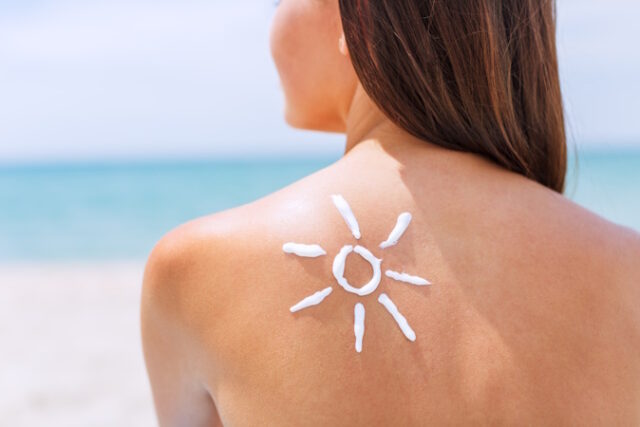
Just about everyone is wrong about sunscreen. On one hand, there’s a low murmur in online spaces questioning the safety and effectiveness of sunscreen, with people like Primal Physique, a “transformation coach,” posting TikTok videos claiming that sunscreens contain dangerous ingredients and should be avoided.
On the other hand, there are people like you and me thinking, “What a load of crap. Sunscreen is totally safe.” We’re wrong too (only a little wrong, but still). Surprisingly, some of what sunscreen deniers claim is true—most of it is wrong, but there’s real reason to be concerned about the safety of some types of sunscreens.
Before I sift through the TikTok bullshit for flakes of truth, here are the undisputed facts: Direct exposure to the sun’s ultraviolet light causes 80-90% of skin cancers. The link between the sun and cancer was suspected as far back as the late 19th century and was proven conclusively in the 1940s. It’s settled science.
The use of sunscreen that blocks UV radiation lowers incidents of skin cancer significantly. Dermatologists nearly universally recommend sunscreen if you’re going to be exposed to sunlight.
The Case Against Sunscreen
Putting research aside for a second, let’s look at the claims of sunscreen skeptics. The specifics vary from influencer to influencer, but the arguments against sunscreen usually include the following:
- Sunscreen contains cancer-causing ingredients that get absorbed into your body. As this mustachioed gentleman puts it, “You’re literally rubbing cancer into your skin!“
- Sunlight is actually good for you.
- Humans have done without sunscreen for hundreds of thousands of years and we’re still around.
- You can prevent sunburns and skin cancer through natural means.
Does sunscreen cause cancer?
The most compelling argument against using sunscreen is that it contains benzene, a cancer-causing substance. This is true—kind of. Beginning in 2021, there were numerous recalls of sunscreens and other skincare products based on the discovery of benzene in them. A study from independent testing company Valise showed that 29% of the sunscreen products tested contained the carcinogen, often in levels high above the safety threshold.
Sunscreen manufacturers weren’t adding benzene to their products, though, so how it ended up there is a bit of mystery. It’s thought that the benzene was either a contaminant or by-products of aerosol propellants used in spray-on sunscreen. The research is ongoing, and ultimately the safety of chemical-based over-the-counter sunscreens that contain accidental benzene is not known. But it’s probably not good for you.
Benzene isn’t the only potential problem: The FDA is currently asking for research to determine whether a number of common sunscreen ingredients that are absorbed into the skin are harmful, but, again, we really don’t know what, if any, harm these ingredients do.
This is not to say you should stop using sunscreen. We may not know how harmful it is to rub benzene-tainted sunscreen into your skin, but we do know that exposing your skin to UV radiation without protection leads to skin cancer. If you’re concerned, you can check your sunscreen against this list of brands that weren’t found to contain benzene.
Is sunlight good for you?
People who question the use of sunscreen often point out that exposure to sunlight is natural and good for you. They are mostly wrong. Exposing your skin to sunlight is a way to maintain healthy vitamin D levels, and we need vitamin D to avoid rickets and other issues, so in that way, exposure to sunlight is “good,” but skin cancer is definitely bad, and a much bigger problem than rickets.
Luckily, you can get adequate vitamin D from your diet or supplements, and you’re probably exposed to enough incidental sunlight for vitamin D production without seeking it out. Endocrinologists and dermatologists generally agree that the risk of skin cancer from sunlight exposure is a way more compelling health problem than a potential Vitamin D deficiency.
People have been exposed to sunlight for thousands of years and we’re still around
It’s true that cavepeople didn’t wear sunscreen, but how many cavemen have you seen around lately? The argument that we naturally evolved to be able to handle sunlight without using sunscreen falls apart when you consider that evolution’s influence ends at reproductive age. Skin cancers tend to show up later in life when we’re not spreading our genes around, so there’s no compelling reason why we would evolve to have UV-tolerant skin.
Can you prevent skin cancer through “natural” means?
On a recent podcast with sunscreen denier and reality TV star Kristin Cavallari, eastern medicine practitioner Ryan Monahan suggested that you eat “an anti-inflammatory diet” to build up an “antioxidant reservoir” in the body, and develop a “base coat” through incremental sun exposure you won’t need sunscreen.
Monahan’s advice about gradual exposure to sunlight is stupid and dangerous. It’s the worst advice possible for preventing skin cancer, because research shows that the risk of cancer from UV exposure is cumulative: Ramping up your sun exposure makes cancer more likely, not less so. A “base coat” tan might make you less likely to get a sunburn, but it’s doing nothing to prevent cancer, and it’s proof that your skin has already been damaged by UV light.
As for the “inflammatory antioxidant reservoir” song and dance, there’s some research that suggests there may be some link between nutrition and skin cancer, but it’s not particularly compelling. There’s no research anywhere that suggests your diet can “counter” the cancer-causing effect of UV radiation. UV light damages the DNA in your cells, leading to cancer. This will happen no matter how much broccoli you eat.
Bottom line: Wear sunscreen
As annoying as it is that online transformation coaches, reality TV stars, and wellness influencers are a tiny bit right about sunscreen (or anything), remember that they’re mostly wrong. It’s not a complicated matter: You should wear sunscreen if your skin is exposed to sunlight because skin cancer is common and very bad.
Disclaimer
Artificial Intelligence Disclosure & Legal Disclaimer
AI Content Policy.
To provide our readers with timely and comprehensive coverage, South Florida Reporter uses artificial intelligence (AI) to assist in producing certain articles and visual content.
Articles: AI may be used to assist in research, structural drafting, or data analysis. All AI-assisted text is reviewed and edited by our team to ensure accuracy and adherence to our editorial standards.
Images: Any imagery generated or significantly altered by AI is clearly marked with a disclaimer or watermark to distinguish it from traditional photography or editorial illustrations.
General Disclaimer
The information contained in South Florida Reporter is for general information purposes only.
South Florida Reporter assumes no responsibility for errors or omissions in the contents of the Service. In no event shall South Florida Reporter be liable for any special, direct, indirect, consequential, or incidental damages or any damages whatsoever, whether in an action of contract, negligence or other tort, arising out of or in connection with the use of the Service or the contents of the Service.
The Company reserves the right to make additions, deletions, or modifications to the contents of the Service at any time without prior notice. The Company does not warrant that the Service is free of viruses or other harmful components.












